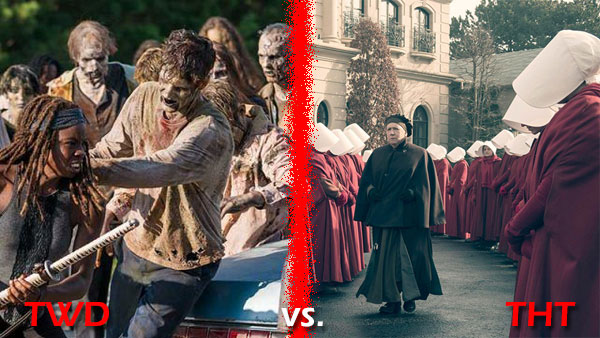The Walking Dead Or The Handmaid’s Tale – In Which Dystopia Would You Rather Live?
Where would you rather live?
- In a zombie apocalypse where the flesh-eating dead run rampant and the comforts of modern society have disappeared.
- In a totalitarian government where fundamentalist religious zealots run rampant and personal freedom and liberty have disappeared?
I have been thinking a lot about this question lately.
Dystopian Television Series
For the last 10 to 15 years or so, dystopian TV shows have been in vogue as a genre. Most of them have been set after an apocalypse of one kind or another.
Below is Oxford Dictionaries definition for dystopia:
Dystopia
An imagined state or society in which there is great suffering or injustice, typically one that is totalitarian or post-apocalyptic.
I have watched quite a few of these post-apocalyptic series over the years, including the ones listed below:
- The Walking Dead (AMC)
Zombie apocalypse where civilization as we know it has crumbled. - The Handmaid’s Tale (Hulu)
Environmental apocalypse where a fundamental theocracy in the U.S. has overthrown the democratically elected government. - Westworld (HBO)
Android uprising at theme parks where human customers engage in elaborate role-playing fantasies. - Humans (AMC)
Android rights melodrama set in the UK (better than Westworld if you ask me). - Falling Skies (TBS)
Alien invasion apocalypse (similar to The Walking Dead but with aliens instead of zombies) — one of the most under-rated series of recent years. - Revolution (NBC)
Permanent power outage apocalypse. - Altered Carbon (Netflix)
Blade Runner-like future. - Black Mirror (Netflix)
Anthology series featuring cautionary tales about technology’s potential impacts on humanity. - Battlestar Galactica (Syfy)
Humans in a war for survival against androids and robots. - Firefly (FOX)
A western set in space after Earth has been “used up.” - Terra Nova (Fox)
Environmental collapse forces humans to time travel back to the age of the dinosaurs.
The list of dystopian TV shows I have NOT watched is even longer and includes the following series, to name just a few: The Man in the High Castle (Amazon), The 100 (The CW), Colony (USA), The Last Man on Earth (FOX), The Leftovers (HBO), 3% (Netflix), Jericho (CBS), Samurai Jack (Cartoon Network), and Into the Badlands (AMC).
Most recently, I have been watching the latest season of AMC’s The Walking Dead (which in November concluded the first half of its ninth season) while at the same time binge-watching the first two seasons of The Handmaid’s Tale on Hulu.
Watching both shows concurrently has provoked me to think quite a bit about the differences between the two dystopian visions. As the shows have been rattling around in my head, I’ve been comparing and contrasting the two mythologies and asking myself the following question:
IN WHICH DYSTOPIA WOULD I RATHER LIVE?
First, for any readers who aren’t familiar with the shows, I’ll provide some background context including my opinions of them.
Spoiler alert: while I won’t be going into much plot detail in this post, you should still proceed with caution if you are not current with either series.
The Walking Dead

The Walking Dead (TWD) takes place in the years after a plague has infected humans. As far as we know, the plague is worldwide (although the two Walking Dead shows take place only in North America so far). In this terrifying new world, anyone who dies wakes up within a few hours as a primitive zombie with an insatiable hunger for flesh (including human flesh). If a zombie bites you, you will fall sick and die within a couple of days. Even if you die of any other cause (e.g. from a regular disease, injury or old age), you still will become a zombie. Every human already carries the infection whether or not a zombie bites them.
As in most zombie mythologies, the only way to kill “walkers” (as the characters on the show call the living dead) is with a lethal blow to the head (via gunshot, knife, spear, arrow, hammer, ax, boot stomp, etc.) as that destroys the zombie’s brain. Since the plague has infected all humans, the zombies multiply like wildfire and even congregate in large herds.
As a result of the zombie outbreak, the government, and civilization as we know it have collapsed. All modern conveniences (power, plumbing, etc.) and communication channels (TV, radio, telephones, the Internet) have failed. Outside of walkie-talkies, survivors have no way of communicating with one another or of knowing what’s happening elsewhere in the country or world. People living in this zombie wasteland try to survive by banding together in small groups and communities, although zombies and — even worse — human tyrants are constant threats.
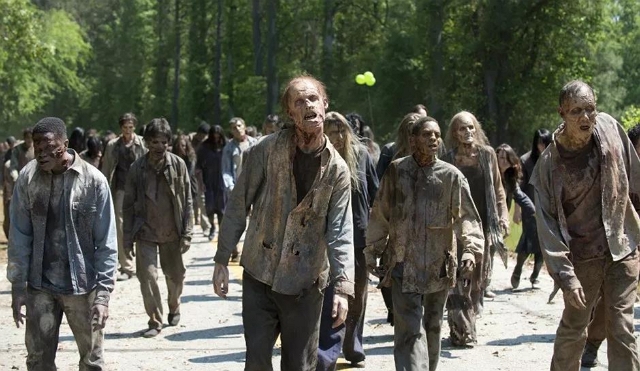
I’ve watched my fair share of zombie movies over the years (and have quite liked a few of them), but overall, zombies are far from my favorite horror trope. Hence, I initially had no interest whatsoever in TWD. However, after hearing more and more hype about the show, I hesitantly tried watching it on Netflix about six or seven years ago.
After several episodes, I realized that the zombies are not the most important part of the show’s premise. TWD really could be set in any kind of apocalypse, and it would be nearly as effective. At its core, the show is a survival tale about people living in extreme conditions. To survive, the compelling inhabitants in this world must constantly make difficult choices, and they have to continually redefine their moral standards in shades of grey. Moreover, when it comes to villains on the TWD, the zombies are downright innocuous compared to the worst human despots we’ve seen so far (e.g. The Governor and Negan and his minions).
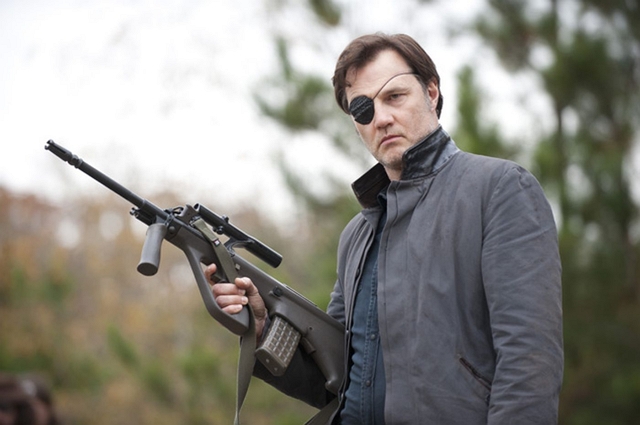
By the end of season 1, TWD had its hooks in me, and it has been my favorite TV show ever since. Despite some ups and downs over its nine-year run, I am just as addicted to it today as I have ever been. I am also a big fan of the spinoff show, Fear the Walking Dead, which has improved dramatically in each of its first four seasons.
I’ve proselytized TWD to friends and family (such as my father and my brother), who were also doubtful they’d like the show. After I advised them to approach the show as a survival drama, they tried it out and have become equally hooked on the series.
For the record, I have not read any of The Walking Dead comic book series (on which the TV show is loosely based), so my knowledge of the universe is strictly from the TV show.
The Handmaid’s Tale
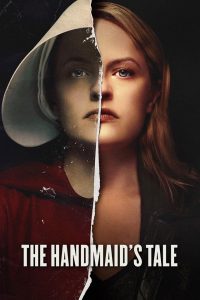
As for The Handmaid’s Tale, I also have not read the source material (a 1985 novel by Margaret Atwood). I did watch the 1990 movie adaptation, but I have no vivid memory of it. So, as with TWD, my knowledge of The Handmaid’s Tale universe is strictly from the TV series.
The Handmaid’s Tale (THT) is set in a future where pollution has caused a number of (mostly unspecified) environmental calamities. The biggest resulting threat to humanity in this post-apocalyptic world is an alarming drop in birth rates. Very few couples are capable of conceiving children anymore.
In response to this worldwide crisis, fundamentalist religious zealots in America execute a coup and take down the U.S. government. The leaders of this movement set up a totalitarian theocracy and rechristen America as The Republic of Gilead. What’s left of the legitimate U.S. government is relegated to an outpost in Canada (which has become a safe haven for refugees of Gilead).
In Gilead society, women, in particular, have become completely subjugated, and society, in general, has become stratified into a strict caste system. Below are some of the key social classes, roughly in order of status (as explained on The Handmaid’s Tale Wiki):
Commander
Commanders are the highest-ranking members of Gileadean society: MEN who serve as politicians and lawmakers, working in Gilead’s government. Because of their high status, the government permits Commanders to marry and also affords them the “privilege” of having a Handmaid assigned to them.
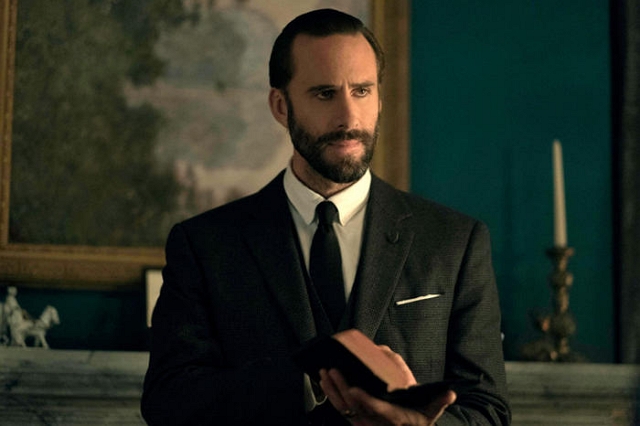
Wife
Married to Commanders, Wives are amongst the highest-ranking women in Gilead, though they are still oppressed and in subjugation to their husbands. Many of the Wives helped create and implement Gilead’s draconian laws and rigid constitution. They have become victims of their own creation.

Handmaid
Handmaids are the most important (but also the most oppressed) class of women in Gilead, as they are responsible for breeding. Handmaids are fertile women who have broken the laws of Gilead. In retribution, the social justice system has assigned them to the homes of Commanders for impregnation. Their primary role is to produce children for infertile Wives.
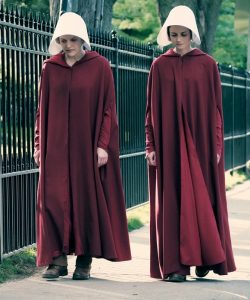
Aunt
Aunts are responsible for training and indoctrinating Handmaids (largely by breaking their will), overseeing births, and monitoring child welfare. They also ensure that Handmaids don’t escape, dole out punishments for disobedience, and preside over executions.
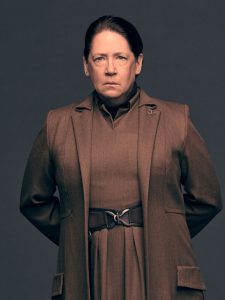
Guardian
Guardians are men who serve as peacekeepers in the cities, foot soldiers in Gilead’s army, and as bodyguards, drivers, and servants to Commanders.
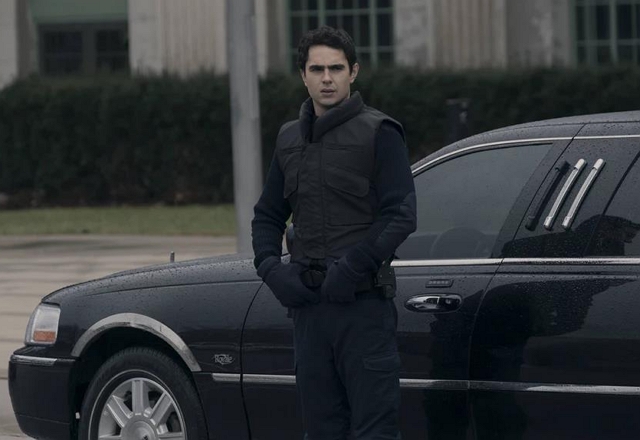
Martha
Marthas are the servants and housekeepers of Gilead. They clean, go shopping and cook and serve meals for the high-ranking family to which the government has assigned them. Most Marthas seem to be infertile, low-ranking, and unmarried women. Most belong to ethnic minorities.
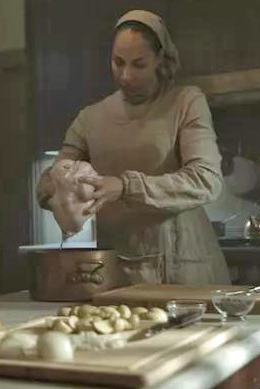
After watching the first two seasons, my conclusion is that THT is gripping, impeccably acted (especially by Elisabeth Moss in the lead role), slow-burning (but tension-packed), and nearly unbearable to watch (due to the unrelenting misery of life in Gilead for nearly everyone who resides there). Season 3 is expected around April 2019.
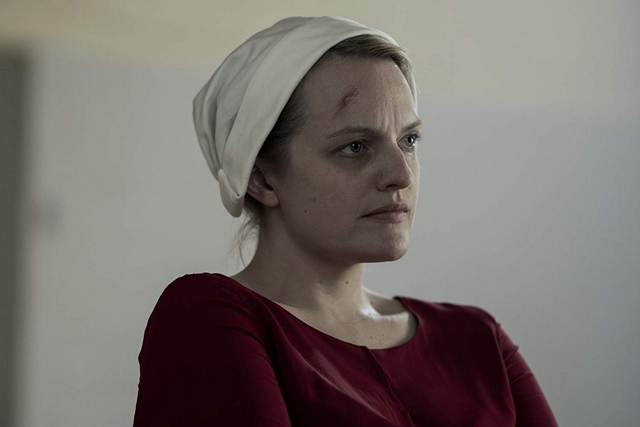
The Walking Dead also has had its moments (or even seasons) of unrelenting misery, but in the balance, the show is more fun to watch, and the characters have more victories to celebrate. That said, this post is not about which show I like better but about which apocalypse I’d rather live in.
What Is Life Like In Each Dystopia?
The Walking Dead
The inhabitants of the zombie apocalypse in TWD face many threats and hardships, but they also have tremendous freedom.
The first reality of daily life is the threat of zombie attacks. However, as many characters on the show have proven, you can survive this threat by being hyper-aware of your surroundings, by staying in groups, by learning how to effectively wrangle and kill zombies, and by experiencing some degree of luck. You can even survive a zombie bite to a limb if you amputate it fast enough. Zombies are mindless and relatively slow-moving, so surviving among them is probably easier than was contending with the predators of our past (lions, tigers, bears, alligators, etc.).
The second reality of life is that all industrial goods and services are gone, as are the central government and system of law and order. Life is about scavenging, hunting, and farming in the new world order — a back to basics lifestyle. For example, if you want “groceries” or supplies, the best way to find them is to ransack houses and stores, most of which other looters have already picked dry. Another option is to steal supplies from other people. Gas is sometimes available in abandoned cars and trucks, but in later seasons of the show, horseback riding becomes a practical necessity. If you want niceties such as electricity, indoor plumbing, or a hot shower, you are mostly out of luck, except for a few isolated communities with generators.
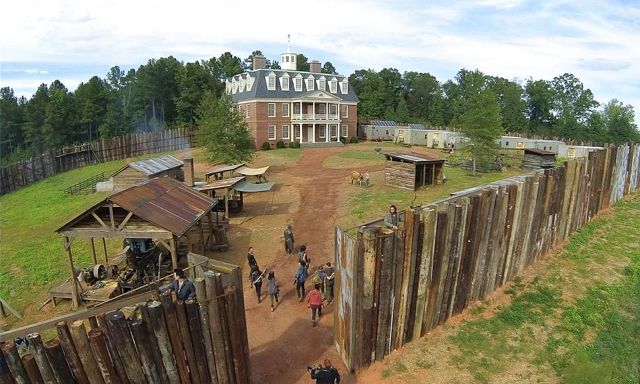
The most dangerous reality in the TWD universe is other living humans. The zombie apocalypse reveals everyone’s true nature: selfish vs. selfless, cruel vs. kind, greedy vs. giving, timid vs. brave, weak vs. resilient, etc. Leaders of all types emerge, including those who rule with inspiration and generosity and those who rule with intimidation and violence. The most horrifying and disturbing moments of the TV show revolve around human tyrants and their various atrocities; Negan and his baseball bat are a much bigger threat than any zombie.
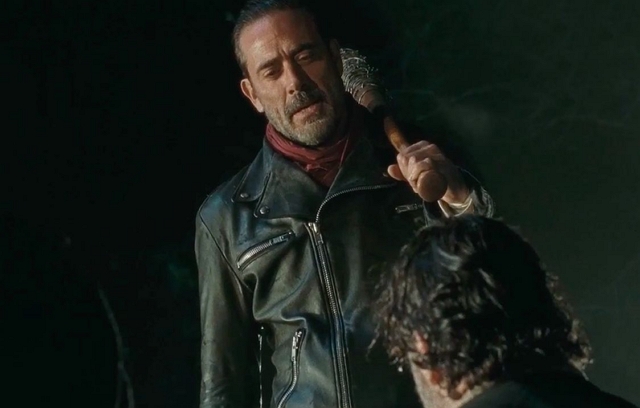
Despite the harshness of the TWD apocalypse, the people living in it have great freedom. The fall of civilization has become a great equalizer, rendering socio-economic classes meaningless. A Fortune 500 CEO has no inherent advantage over a grocery store clerk in the new world order (and perhaps is at a disadvantage). A college education is worthless, unless it was in something practical like agriculture.
Likewise, men have no inherent advantage over women (except for greater physical strength in some cases) — and they have no more power or authority than do women. In fact, just as many women as men are leaders or heroes. In this world, even an abused woman who suffered from years of domestic violence before the apocalypse can transform herself from a victim into a cunning survivor and fierce warrior (e.g. the character of Carol, wonderfully played by Melissa McBride).
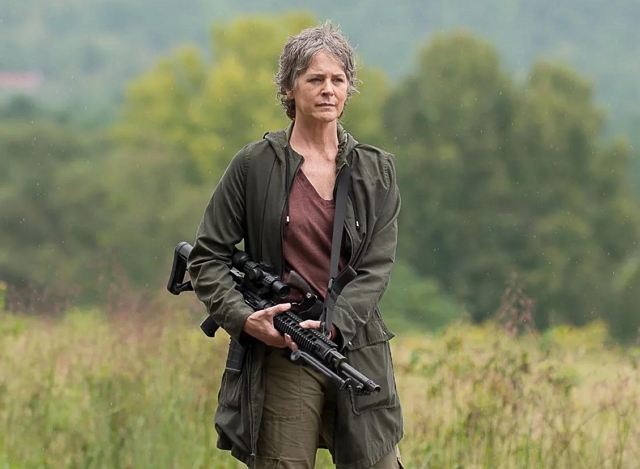
People in this brave new world are also color blind: nobody cares anymore about your racial heritage — people care only about whether you are alive … or a zombie. People of color are equally (if not disproportionately) represented among the movers and shakers of the various survivor groups and communities. Similarly, homophobia appears to be a meaningless relic of the past for anyone trying to survive in the zombie apocalypse. At least two same-sex couples live in the town of Alexandria, VA (a walled town relatively safe from zombies), and the only thing that matters to the other residents is whether these couples are contributing to the community.
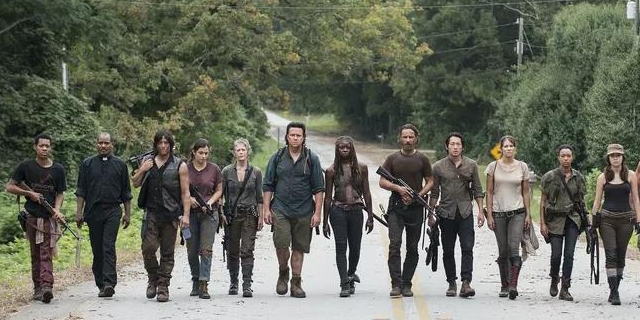
One key advantage inhabitants of TWD have over those of THT is social mobility. People can choose to go it alone or stay in small groups — or they can join larger communities. If any social situation turns out to be unbearable (e.g. living under the rule of a dictator like Negan), then you can simply leave the group and find another one (easier said than done in some cases but usually possible with the right motivation). You are never fully trapped.
Finally, friendship, love, family, and even humor are still unifying forces in this otherwise brutal world … and they make life bearable and worth living.
The Handmaid’s Tale
As compared to the zombie apocalypse, life in Gilead is more comfortable, for the most part, but it’s no picnic.
In Gilead, the basics of civilization, government, and industry are still in place. Phone service still exists, grocery markets are stocked with most staples, law and order is in effect (though in a far more oppressive way than before). Overall, life has most of the physical comforts everyone was used to before the religious coup.
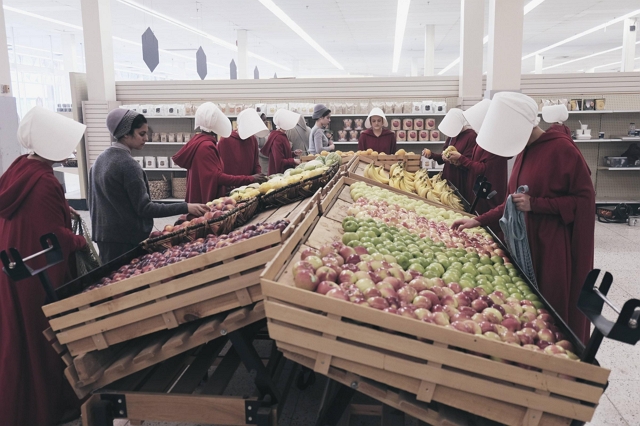
On the other hand, freedom (including free speech and free love), liberty, and justice are all extinct.
As I explained earlier, society has become stratified into distinct social classes, and upward mobility is not a thing. In public, armed guards (“Guardians”) are omnipresent and watch your every move.
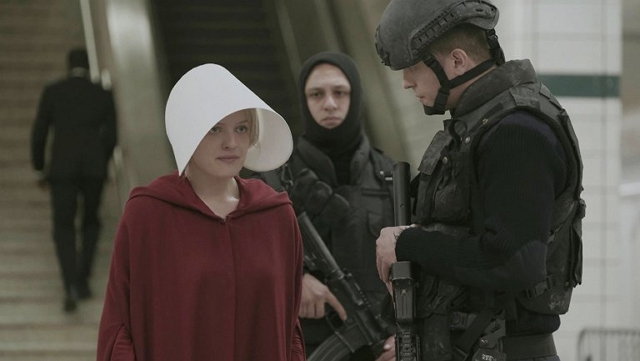
One distinct advantage of life in the THT over life in TWD is that the worst elements of the apocalypse seem to be confined to Gilead (what used to be the U.S.). The rest of the world may also be experiencing environmental catastrophes and birth rate declines, but at least sane governments — and society as we know it — are still in place. So, if you live in Gilead and can escape to Canada or elsewhere, you have the chance to return to a life of relative normalcy. The denizens of The Walking Dead universe do not have this option. As far as we know, the zombie plague spread worldwide, and we know for certain that it hit Mexico (as some episodes of Fear The Walking Dead are set there).
On the downside, escaping from Gilead is nearly impossible, as June (the story’s protagonist) finds out again and again. Within Gilead, the totalitarian government and its rigid laws are suffocating and inescapable (unless you are a Commander who patronizes secret after-hours clubs where all kinds of vices are still available).
The strict (and unfair) justice system inflicts merciless punishments — everything from gouging eyes out and amputating limbs for minor crimes (e.g. for speaking out of turn and for reading which is forbidden for women) to death by hanging, stoning, or drowning for more serious offenses. In fact, executed heretics and dissenters are hung out for display from walls and lamp posts as brutal reminders to Gilean civilians of the price of disobedience. By contrast to TWD, homosexuality is illegal in Gilead, and the government condemns those who practice it as “gender traitors” and subjects them to capital punishment.
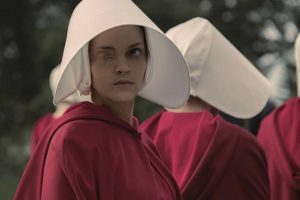
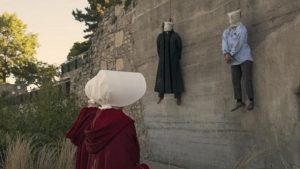
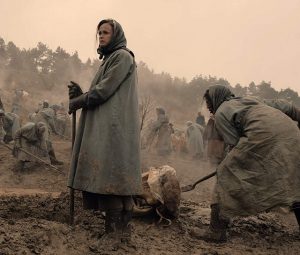
Men in Gilead, who hold nearly all of the power, completely oppress the women in the society, no matter what their role or status.
Wives ostensibly have some respect and power but only over servant staff and lower-caste men, whereas they are 100% subservient to their Commander husbands. Gilead’s rulers (all men) do not allow Wives to participate in government or any real decision-making.
Handmaids are sex slaves whom Commanders rape once a month when they are most fertile. In a “holy ceremony,” Wives will sit on the bed and hold down the Handmaid’s arms while their husbands copulate. Unbeknownst to their Wives, some Commanders do not restrict their sexual activities with the Handmaids to the official monthly ceremony.

If a Handmaid gives birth to a baby, she typically stays in the house only until the baby is weaned from breastfeeding. At that time, since the government recognizes only the Wife as the true mother, they separate the Handmaid from her baby and re-assign her to a new Commander in a new house where the vicious cycle begins again.
On top of all this, Handmaids suffer the indignity of losing their birth names. The name of the Moss character is June, but when the government assigns her to a Commander named Fred, they rechristen her as “Offred” (of Fred). For the same reason, they rename her friend Emily to “Ofglen” (of Glen). Every time a Handmaid joins the household of a new Commander, her name changes. The Gilead society is expert at finding ways to dehumanize people and make them subservient.
Martha’s are essentially indentured domestic servants who serve Commanders and Wives. Like Handmaids, they are trapped in their social class.
Of all the women in Gilead, only Aunts have any real standing in the society since they are responsible for overseeing pregnancies and safely delivering babies. Men even allow them to read. While watching each episode, I keep hoping for a secret resistance movement among the Aunts, but so far they are just as dogmatic and despicable as the Commanders and just as complicit in keeping women subjugated.
THT is a horrific vision of what America (or any Western country) could become if the most extreme, racist, sexist, homophobic, and hateful segments of society were to come to power.
The Lesser Evil
Now that you have a sense of the two dystopias (one outlandish and one not so inconceivable), if you had to live in the former U.S., which apocalypse would you choose? The Walking Dead or The Handmaid’s Tale?
For me, the choice is easy: I’d take the zombies and The Walking Dead.
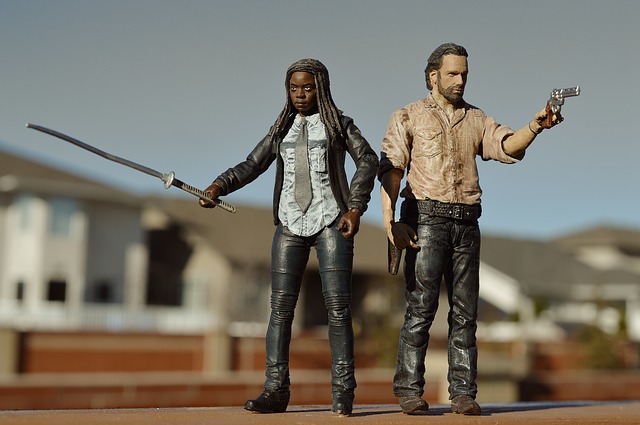
I find the institutional sexism, racism, homophobia, oppression, and brutality of Gilead far more horrifying than the flesh-eating zombies of TWD. Also, as I’ve mentioned, although TWD has its fair share of cruelty and inhumanity, those predicaments are far easier to escape than trying to get out of Gilead (especially if you’re a woman). For me, the personal liberty available in TWD, along with the diversity of the leaders and heroes, make that the world in which I’d rather live, despite its many hardships and lack of creature comforts.
Maybe my reaction to THT is so extreme because social injustice and oppression have been hot-button issues for me ever since I was a kid. I’m not sure why. Maybe because I was born that way. Maybe because I grew up in ultra-liberal Berkeley, California. Maybe, in part, in reaction to watching the original Roots TV mini-series at the impressionable age of ten years old.
Maybe my choice all boils down to this: no matter how bad things get for the characters in The Walking Dead, I always see signs of HOPE for the future — hope that the best parts of humanity will rise to the surface and triumph. By contrast, the first two seasons of The Handmaid’s Tale seem relentlessly and depressingly hopeless; so far, the worst of humanity is winning (in Gilead at least). That said, season 2 introduced a few cracks in the foundation of Gilead and a few faint glimmers of hope. And for that reason, I am very much looking forward to season 3. Just don’t ask me to live there!
What do you think? Which dystopia would you rather inhabit? What other contrasts between the two societies are important to you? Which other television dystopias would you choose or compare?
Let me know in the comments.
(Note: I moderate all comments so you may experience a delay before your comment appears on the post. For any SPAMMERS out there, don’t waste your time submitting as I will reject your comment.)

